Calling fire on myself
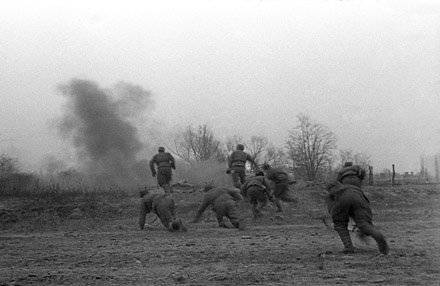 October 24 The 1943 reinforced battalion of the 185 Guards Rifle Regiment on the pontoons crossed the Dnieper and fought a bit with the enemy on a small bridgehead on the largest island on the Dnieper, Khortytsia.
October 24 The 1943 reinforced battalion of the 185 Guards Rifle Regiment on the pontoons crossed the Dnieper and fought a bit with the enemy on a small bridgehead on the largest island on the Dnieper, Khortytsia.Artillery spotters and radio operators led by the chief of intelligence of the artillery division of the guard, senior lieutenant Boris Kravtsov, crossed the infantry along with the infantry.
The island of Khortytsya - twelve kilometers long and about three wide - is primarily known for the fact that it was here that the famous Zaporizhian Sich was located. Our ancestors were the first to appreciate the advantages of a high and rocky stretch of land, the approaches to which on the one hand blocked the Dnieper rapids, and on the other impassable drifts. From here it was well looked through, so, the water smooth surface was shot through. All this turned Khortytsya into a natural fortress.
В history The Great Patriotic Island entered by the fact that it was here at the very beginning of the war that one of the first offensive operations of the Red Army was carried out.
The fascists occupied the island in August, forty-first, and from its high banks well looked through the nearby city of Zaporozhye. Our troops were in a difficult position. How to organize the evacuation, if the factories, streets, train station and railway lines are under constant surveillance and continuous shelling of the enemy?
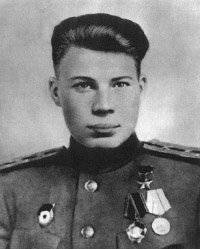 The Soviet command decided: knock out the Germans from Khortitsa. For the success of the operation it was necessary to collect information about the enemy. But to get to the island, you need to overcome the left arm of the Dnieper a few hundred meters wide, and it was clearly visible.
The Soviet command decided: knock out the Germans from Khortitsa. For the success of the operation it was necessary to collect information about the enemy. But to get to the island, you need to overcome the left arm of the Dnieper a few hundred meters wide, and it was clearly visible.And then the officers asked one of the boys, who had swum from Khortitsa to our left bank, to come back and try to reconnoiter the firing points and combat positions of the Germans on the island. It was much easier to do to the guys that lived on the island than to the best scouts: there was a village on Khortitsa, beaters, carriers, and local boys, naturally, did not arouse much suspicion among the Germans. Knowing all the secret trails of the island and its numerous floats, the guys coped with the task, and the next day our artillery destroyed the fascist headquarters, which was located in the building of the former day nursery, and the accumulation of troops in the Broad Beam.
After that, the boys began to receive new tasks. They not only conducted reconnaissance, but also distributed leaflets, cut lines of communication, helped the wounded Red Army soldiers who remained on the island after he was captured by the Germans to cross to our coast, and sent messengers sent to the partisan detachments to the captured right bank of the Dnieper. And one of the nights the guys swam to the island, carrying everything you need in caps tied to their heads. At exactly the appointed time, bonfires flashed next to the enemy firing points. Our artillery also hit them. Thanks to their help, our troops liberated the island from the enemy, and were able to hold Zaporizhia for a month and a half. The city had the opportunity to evacuate the plants.
Most of the young heroes died. The film “I am Khortytsya” was shot about their feat.
Two years passed, and with heavy fighting on October 14, our troops liberated Zaporizhia. Further offensive action was seriously hampered by the enemy entrenched on Khortitsa. The Nazis had strong fortifications on the island, which were to be taken, forcing the deep-water river in its lower reaches.
While the troops were preparing for a new offensive, pulling up the rear and bringing ammunition and food, the artillery scouts were in suspense. Boris Kravtsov carefully studied the island. Having settled down in the attic of a six-story house damaged by bombing, the scout looked into the hilly territory of the island, the area covered with groves and bushes, the surviving and dilapidated buildings. He mapped landmarks, firing points and enemy defenses, sketched with colored pencils a panorama of the visible part of the island and the right bank of the river.
Boris Vasilyevich drew well, he was often asked to paint the front edge of the enemy on paper. He did this usually in several copies - to the commanders of the fire platoons, the chief of staff, leaving the scheme to himself.
At the end of October 24, Kravtsov reported to the artillery division commander Captain Lamin about what he had been able to see and detect. It was clear that the Germans had dug firmly into the stony ground. Their fortifications were solid, and the shores of the island were high and rocky.
Soon followed by a call to the headquarters of the division, where Lamin put Kravtsov task to adjust the artillery fire. Boris Vasilyevich was to go with a group of intelligence officers, along with an assault battalion, which would force the Dnieper and disembark at Khortitsa.
To perform in 21.00.
Understanding what his subordinates were going to, the division commander promised to support the battalion with fire. To do this, Kravtsov had to transfer to headquarters the exact coordinates. He understood: survive one chance out of a hundred. But the order is an order.
They came to the shore when night fell over the Dnieper. In the sky, no stars, no moon - complete darkness! Only occasionally from the enemy’s side did the rocket fly up into the sky, illuminating the shore, and from time to time a powerful searchlight beam slid along the black as tar water surface.
Were smuggled in secret, the Germans did not find the troops. But when the pontoon ran aground and the soldiers began to jump into the water and ran to the shore, the enemy opened fierce shooting ...
But the surprise attack did its job: the Nazis quickly moved into the depths of the island. The strike group in a small area took possession of their trenches, capturing even the gun left during the escape.
In the German dugout, in which they even found fascist award signs with questionnaire forms, equipped an observation post. Volodya Mozgunov, the best radio operator of the division, a fair-haired Ryazan guy, who literally nursed the radio as the most cherished thing, and therefore she worked with him flawlessly, contacted the division commander. Kravtsov reported the exact coordinates. A large oak was chosen as a landmark, which was clearly visible from the left bank ...
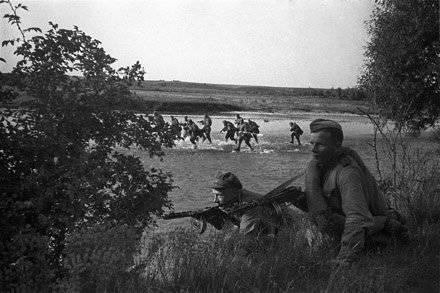 I did not have time to report the situation, as the silence of the night was broken by a prolonged howl of enemy mines. The coordinates of the enemy's mortars were immediately transferred to the left bank. Artillery started talking. The firing points of the enemy were covered, but the Germans had superior forces and threw them to knock the troops off the island.
I did not have time to report the situation, as the silence of the night was broken by a prolonged howl of enemy mines. The coordinates of the enemy's mortars were immediately transferred to the left bank. Artillery started talking. The firing points of the enemy were covered, but the Germans had superior forces and threw them to knock the troops off the island.The fierce mortar and machine-gun fire on the positions of the battalion did not stop throughout the night, and therefore Kravtsov constantly had to correct the fire of the left-bank batteries, helping the infantry to repel the opposing enemy. His commands sounded all night on air: “A fragmentation fuse, a full charge, a compass twenty six ... level, sight ... Two projectiles, fire!”, “Six projectiles, quick fire!”, “Level less than zero-two ...”
During the night, repulsed eight attacks. The commanders were in the trenches with the infantry, Kravtsov - at the entrance to the dugout to watch where the shells explode. Every now and then he asked: “Twinkle, add a spark!”, And they added.
At dawn, the fascists launched a new mortar squall to the landing, and in the morning the enemy submachine gunners broke through the barrage.
The position of the bridgeheads was extremely difficult, the cartridges were running out, and there were few grenades. And there are still a few hours of daylight ahead, because help could come only after dark. Many were thirsty. From dust and smoke there was nothing to breathe. The ammunition was protected and, if possible, the enemy was allowed within a distance of an aimed shot. In order to protect the soldiers from being wounded in the head during artillery strikes, they dug fox holes - round depressions in the trench wall. When an intensive mortar attack began, the soldiers shoved their heads into the “holes”. It helped save people in some way.
From everywhere came the cries: “Rus, Rus, surrender! Rus kaput! ”A German ran very close, another. Kravtsov, seeing that a machine gun was being installed behind the dugout, almost at close range, shot one of the enemies with a pistol. Grenades rained down on the dugout.
The German ring shrank more and more tightly, and Kravtsov clearly heard the rustling of sand - the fascists crawled up behind and to the right. The ranks of artillery scouts thinned.
Understanding that he was about to be finished with them, Boris Vasilyevich looked at the fighters. They were ready to rush hand to hand. And only one of us had acting in full force. weapon - walkie-talkie. I managed to look at Mozgunov: my eyebrows were shifted, I went all the way into my headphones. Kravtsov shouted: “Pass it on! We are surrounded. The goal - our NP, fire on me! Fire at me! ”
Moszgunov seemed to be waiting for this. With fervor, he picked up the team, as if she brought him the joy of deliverance, and not death. On the other side, at first they thought that they had misunderstood these desperate words. The radio operator of the left bank asked again. Kravtsov shouted to them: deaf, perhaps, your mother, and so on, well, as usual at the front in such cases. And then at the very entrance a grenade exploded, wounding it in his left hand. In this case, the radio was damaged. Mozgunov raised it, turned it and threw it. Now you can not repeat the command. And there is no fire. And then everyone heard the sound of shells flying at the end of a flight. Ours, from the left bank. All bent in three deaths. The first salvo is a flight, the second is an undershoot, and the third is straight through the dugout. Germans washed away like mud from the roof of a torrential rain. And the scouts got it. There was a hole in the ceiling, and logs, piles of sand and earth fell on them ...
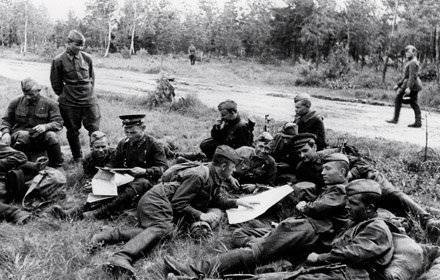 Waking up, Kravtsov realized that he was overwhelmed with debris. With difficulty, he freed his hands. Heaving and grunting, he pulled his legs out from under the beams. Slowly he rose, tried to shake off. There was weakness in the whole body. And then he heard a moan from the far corner. It was Mozgunov. He rushed there and began to convulsively disassemble the blockage. Fortunately, the radio operator received only minor head and leg injuries. Hastily bandaged the wounded man as best he could, crawling him on the right flank to his own. And there, by wire, I asked him to connect him to the division. When I heard a familiar voice on the phone, I shouted: “I am Kravtsov. I tell you - Kravtsov! What? Killed? As you can see, alive. So, a trifling scratch. Anyway. Take the coordinates. They are attacking us again ... ”And the usual thing went: a full charge ... a sight ... four projectiles, rapid fire!
Waking up, Kravtsov realized that he was overwhelmed with debris. With difficulty, he freed his hands. Heaving and grunting, he pulled his legs out from under the beams. Slowly he rose, tried to shake off. There was weakness in the whole body. And then he heard a moan from the far corner. It was Mozgunov. He rushed there and began to convulsively disassemble the blockage. Fortunately, the radio operator received only minor head and leg injuries. Hastily bandaged the wounded man as best he could, crawling him on the right flank to his own. And there, by wire, I asked him to connect him to the division. When I heard a familiar voice on the phone, I shouted: “I am Kravtsov. I tell you - Kravtsov! What? Killed? As you can see, alive. So, a trifling scratch. Anyway. Take the coordinates. They are attacking us again ... ”And the usual thing went: a full charge ... a sight ... four projectiles, rapid fire!The daredevils kept the bridgehead conquered on the island until reinforcements arrived. By night, a large landing force landed on Khortytsya. The evacuation of the wounded began. Only three dozen people could move independently. With sunken eyes, in torn, sweat-smelling and powder uniforms, they encouraged the "heavy."
More than twenty officers and almost 200 privates and sergeants remained on the island forever, but by the battle for the bridgehead on Hortitsa they diverted considerable enemy forces from those sectors where the main forces were preparing to force the Dnieper. Kravtsov from his small group lost two.
In a bloody shirt, in a tunic with a torn sleeve, he came to headquarters. The division commander was not, and he reported to the chief of staff Sychev that the task was completed. He sincerely rejoiced at the return, embraced Kravtsov, thanked for the task and sent to the medical battalion.
After two weeks of treatment, Boris Kravtsov returned to service. Ahead were no less fierce battles for the right bank of the Dnieper.
By that time he had fought for a year and a half, since the spring of forty-second. He graduated from the Odessa Artillery School, which was then transferred to the city of Sukhoi Log of the Sverdlovsk region.
The two-year program of the course "artillery instrumental reconnaissance" was to be mastered in eight months. Studied conscientiously, eagerly. Discipline and diligence were supreme. Understood: war will not tolerate underestimation. At the end of the school, Kravtsov was sent to the South-Western Front as the commander of a topographic reconnaissance platoon of the artillery division. It was the summer of 1942. The mood in the troops was rather dull. Defensive battles, continuous failures. We tried to attack, but to no avail. In late May, the Germans launched a powerful counterattack and pushed us to the east coast of the Seversky Donets. The Messers flew at an altitude of 10–20 meters and shot the retreating from the shaving flight. The equipment burned, the wounded moaned. A German Tanks eager for Stalingrad.
A front-line soldier who miraculously survived in that meat grinder recalls that sometimes in villages and farms he met Red Army men without weapons. I heard from them that fighting with such force is useless and it is better to surrender voluntarily into captivity ...
At first he felt rather timid. Hearing the enemy shots, fell, pressed his head to the ground. But quickly mastered the situation. All subordinates were older than the young lieutenant: someone was the principal, three teachers, and all the squad leaders had several years of service behind them. People were selected experienced and in the everyday plan, and in military affairs. Kravtsov at that time was only nineteen ... Embarrassment quickly passed, and mutual understanding appeared.
Over time, the units of the artillery regiment, completing a heavy forced march, settled east of the Yagodny camp in the Stalingrad region. However, by that time there was no farm, instead of houses, only black pipes stuck out like crosses in a cemetery.
In those places, the gunners met a harsh winter with snow drifts. Having dug round in a beam of the steppe blown by all winds, in poorly equipped dug-outs in one roll, they sat for a long time without firewood and even sometimes without drinking water. Over 25 kilometers, along an icy and snowy road, it was difficult to get to the front line everything you need - from ammunition to firewood. Under these conditions, the division was preparing to speak out against the 11 Infantry Division of the Romanian Division.
The platoon of Lieutenant Kravtsov did his job: he marked the firing points, command posts and the location of the enemy’s military equipment.
It was there that Boris Vasilyevich really understood what artillery reconnaissance is, because he often had to be ahead of the infantry, beyond the front edge. Sometimes they crawled over the outposts, about two hundred meters ahead. To enemy trenches closer than their own. The scouts were obliged to recheck all the initial data collected by infantry observers. Always with him, Kravtsov had a walkie-talkie with which he transmitted the exact coordinates of identified enemy objects. Happened that reported them by phone. Sometimes it was located so close to the Germans that it was possible to hear their speech, the commands given.
And then there was a particularly memorable morning for 19 November 1942, not only for Kravtsov. It was quiet, with a slight frost, with a thin fog in the lowlands and beams. And suddenly the air lit up and shuddered. It hit our artillery, all at once, so much so that the earth trembled, glass fell down. The guns of the division of Captain Lamin sounded in this cannonade. And they beat on the very targets that they discovered and spotted the scouts, "eyes and ears." As Boris Vasilyevich recalls, many had tears in their eyes.
And the war ended for him 31 December 1943 of the year: he was seriously wounded in the thigh of his right leg by a fragment of a shell exploded nearby. The blow was so strong that Kravtsov had the impression that it was a blow with a heavy log. Fell like knocked down. The whole wall of the hut was riddled with fragments, one of them fell into it, broke the bone of the hip and got stuck in the wound. Miraculously survived.
Fortunately, the medical orderly Anya Brovkina, a small, frail girl, quickly ran up to the officer. She dragged Kravtsov to a safe place and tied up a wounded leg. In 12 hours of the night he lay on the operating table in the hospital of the city of Zaporozhye. The doctor congratulated him on the New Year, 1944, and ordered the nurse to give anesthesia.
For a long time, Boris Vasilyevich was treated in hospitals in Zaporozhye, Slavyansk and Leninakan. In the hospital, I learned that by the Decree of the Presidium of the Supreme Soviet of the USSR from 19 March 1944, "for the exemplary performance of command missions and the courage and heroism shown at the same time" he was awarded the title Hero of the Soviet Union.
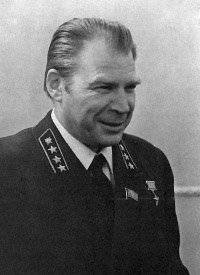 In June, 1944, an artillery guard, was recognized as a disabled 2 group and demobilized from the army. So all his dreams of a military academy collapsed at once. 22-year-old Hero of the Soviet Union returned to Moscow. For almost four months he completed the wounds. I could not even work. Lived with his mother. The war took away his father - Vasily Alekseevich went missing in 1941 year. In the fall of 1944, he entered the Moscow Road Transport Institute, but due to the aggravated illness he soon had to leave his studies. And again half a year of forced idleness. The disease receded slowly. In September, 1945, when the pain subsided a bit, he nevertheless entered the Moscow Law School. Later he graduated from the All-Union Law Correspondence Institute and made a brilliant career as a lawyer. He started as a member of the linear court of the Moscow-Oka basin, dealt meticulously with his affairs, trying to penetrate into their very essence. In each defendant, he tried to see first of all a person. His heart especially squeezed when former front-line soldiers appeared in court. In such cases, he was extremely vigilant in all the details. Even in those harsh conditions, when the well-known decree from 4 of June 1947 of the year “On criminal liability for theft of state and public property”, harsh and merciless, significantly increased the punishment for theft, he was not afraid to justify those who committed crimes under the pressure of difficult life circumstances.
In June, 1944, an artillery guard, was recognized as a disabled 2 group and demobilized from the army. So all his dreams of a military academy collapsed at once. 22-year-old Hero of the Soviet Union returned to Moscow. For almost four months he completed the wounds. I could not even work. Lived with his mother. The war took away his father - Vasily Alekseevich went missing in 1941 year. In the fall of 1944, he entered the Moscow Road Transport Institute, but due to the aggravated illness he soon had to leave his studies. And again half a year of forced idleness. The disease receded slowly. In September, 1945, when the pain subsided a bit, he nevertheless entered the Moscow Law School. Later he graduated from the All-Union Law Correspondence Institute and made a brilliant career as a lawyer. He started as a member of the linear court of the Moscow-Oka basin, dealt meticulously with his affairs, trying to penetrate into their very essence. In each defendant, he tried to see first of all a person. His heart especially squeezed when former front-line soldiers appeared in court. In such cases, he was extremely vigilant in all the details. Even in those harsh conditions, when the well-known decree from 4 of June 1947 of the year “On criminal liability for theft of state and public property”, harsh and merciless, significantly increased the punishment for theft, he was not afraid to justify those who committed crimes under the pressure of difficult life circumstances.In 1971, Boris Vasilyevich was appointed the Prosecutor of the RSFSR and at that high post he fought lawlessness and arbitrariness, defending first of all ordinary people. From 1984 to 1989, the year Kravtsov headed the USSR Ministry of Justice. Currently, the honored lawyer of Russia, an honorary employee of the prosecutor's office, a full member of the Academy of Military History, an honorary citizen of the cities of Kamensk-Shakhtinsky and Derbent is on the board of the Heroes Club of the Soviet Union, Heroes of Russia and full gentlemen of the Order of Glory. Since 1993, he has been an adviser on legality issues in the Russian Attorneys Guild. And also - an avid fisherman and lover of travel.
Information